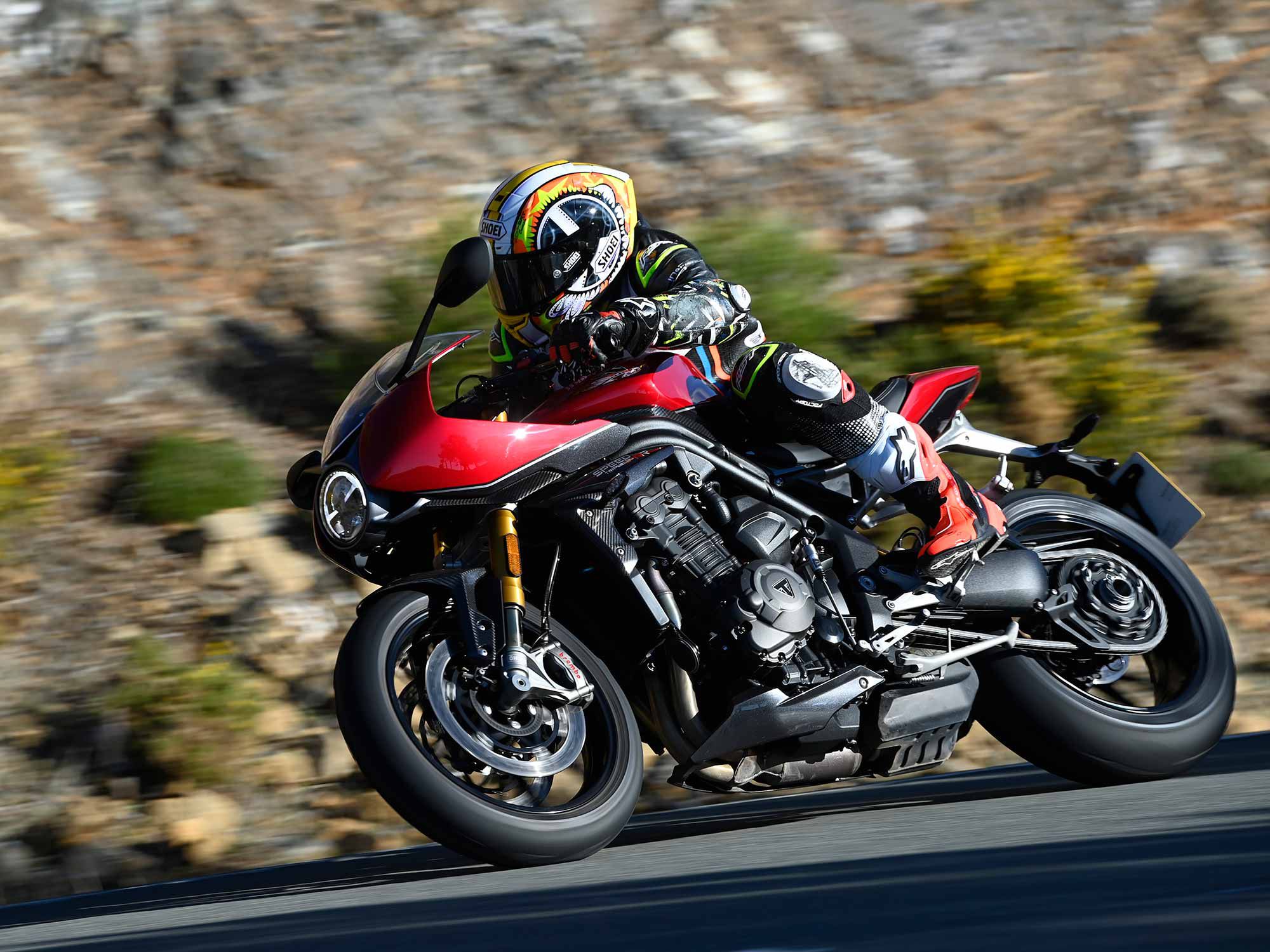
Triumph has based the distinctive new 1200 RR on its 178 hp (claimed) RS, which was launched at the start of 2021. The British brand has made some bold claims and confidently predicted that this will be “the most exhilarating Speed Triple ever,” and “the ultimate sports bike for the road.”
Underneath its stunning cafe racer cockpit fairing and dashes of carbon fiber, there is new suspension, now Öhlins Smart EC 2.0 electronically adjustable semi-active units, and new Pirelli Diablo Supercorsa SP V3 rubber. The rider is moved forward in the chassis, behind that charismatic single round headlight, with a slightly longer reach to the handlebar.
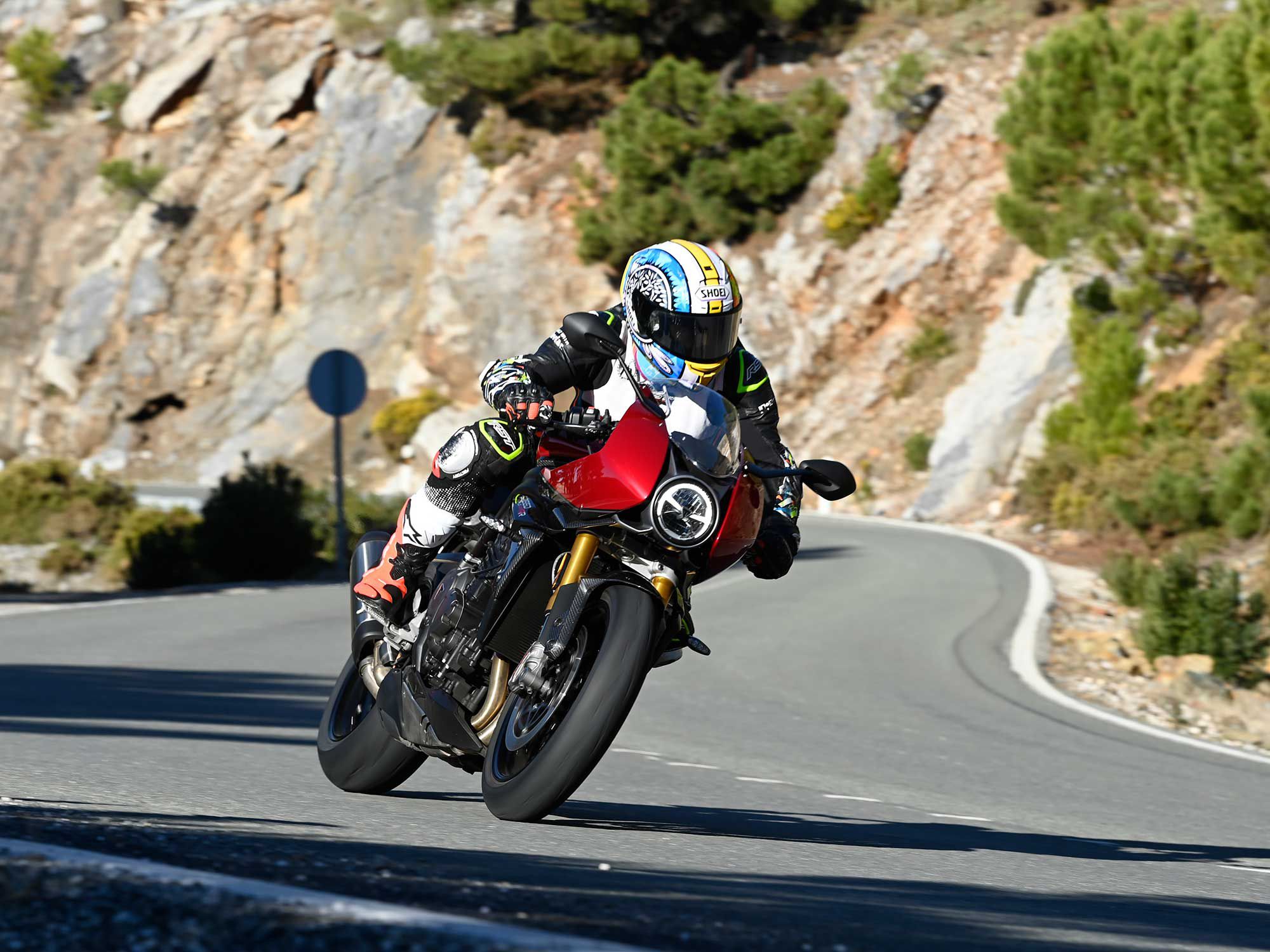
The RR utilizes the same three-cylinder engine as the RS, of course. It also retains the naked bike’s Brembo Stylema brake calipers with MCS levers, full-color 5-inch TFT dash, up and down Shift Assist, five riding modes, a full keyless system and lean-sensitive rider aids.
In the early morning Spanish sunlight, the RR looks as beautiful as it did in PR pictures released earlier. The single headlight strikes just the right note, and the lines of the RR flow to the rear end as if it was always designed to be a cafe racer rather than a naked with a top fairing bolted on.
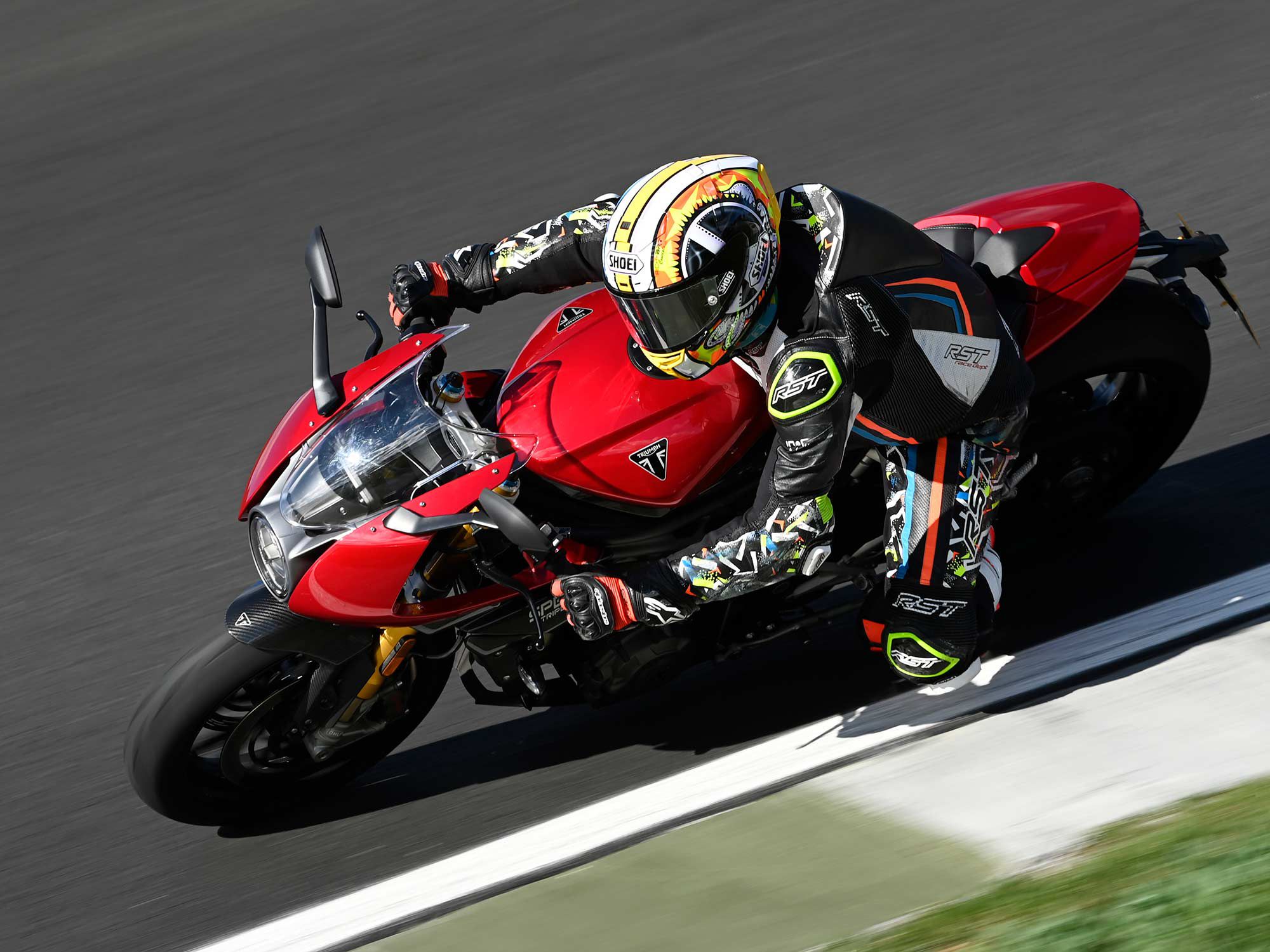
Blipping the fly-by-wire throttle gets the digital rev counter dancing and the triple’s music echoes around the paddock, making me wonder how the Hinckley factory attains Euro 5 certification when other manufacturers continue to roll out muted streetbikes.
As the temperature rose just above freezing it was time to get a flavor of the new Triumph. Thankfully, Triumph had been kind enough to add the optional heated grips.
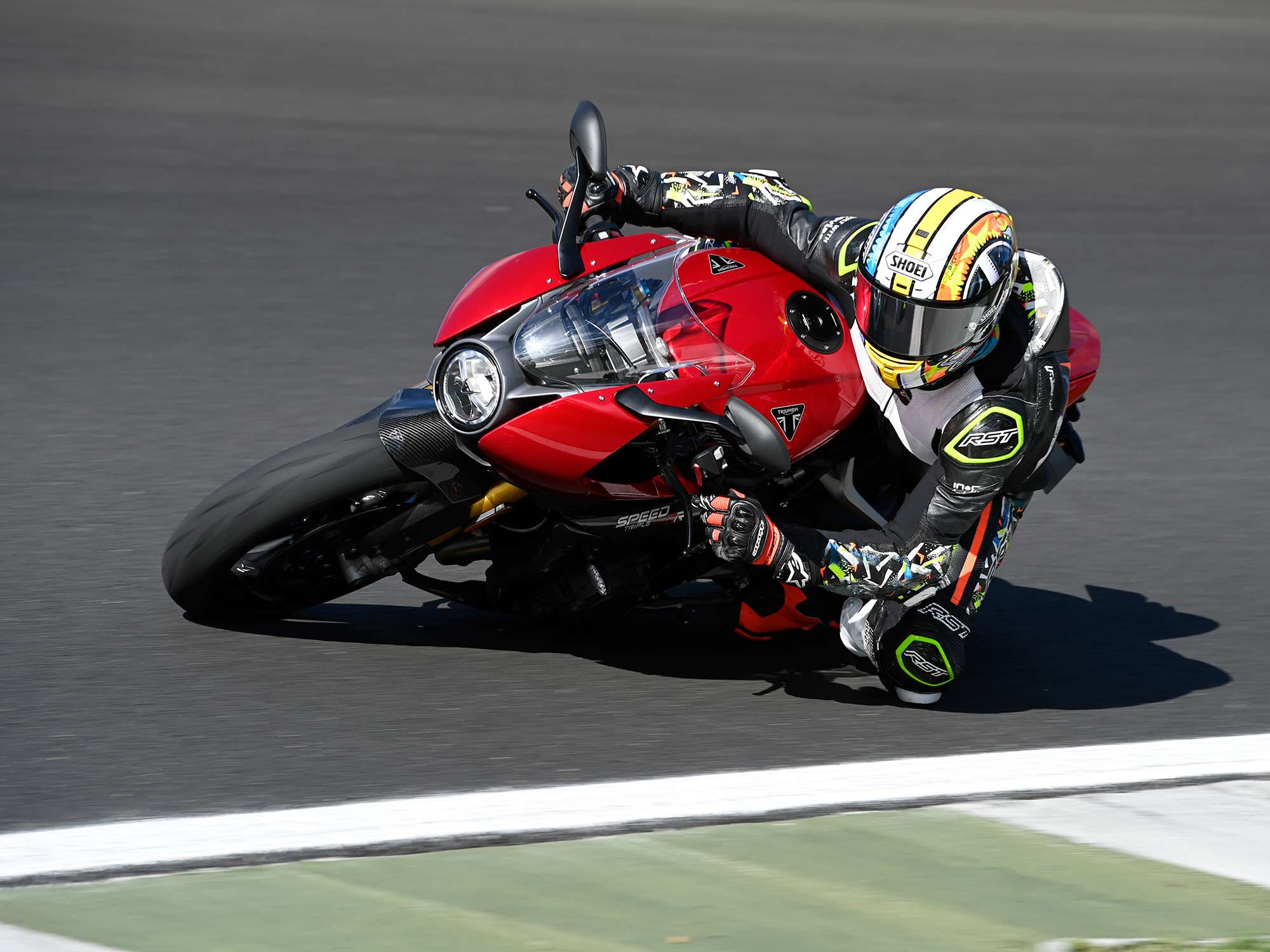
I mention the early morning freeze as the temperature was too low for the Pirelli Supercorsa SP V3 rubber to shine, and combined with the suspension set to “comfort” the 1200 RR initially felt slow to steer. However, as the temperature rose, and the road began to flow, I soon realized that Comfort mode on the suspension means just that: soft and comfortable, not sporty at all. In Road and Rain mode, the suspension automatically reverts to a comfort mode setting, which, yes, blunts the steering slightly, but does produce a lovely, plush ride.
Flicking into Sport mode, and the 1200 RR changes its character. The suspension stiffens, the chassis has more hold, and the steering is sharper and more accurate, which in turn adds confidence and allows you to hit the road a little harder. There’s a notable difference between the riding modes, especially the reaction and movement of the semi-active suspension, and even riders less experienced in the nuances of modern electronics will appreciate the significant step in suspension feedback and feel.
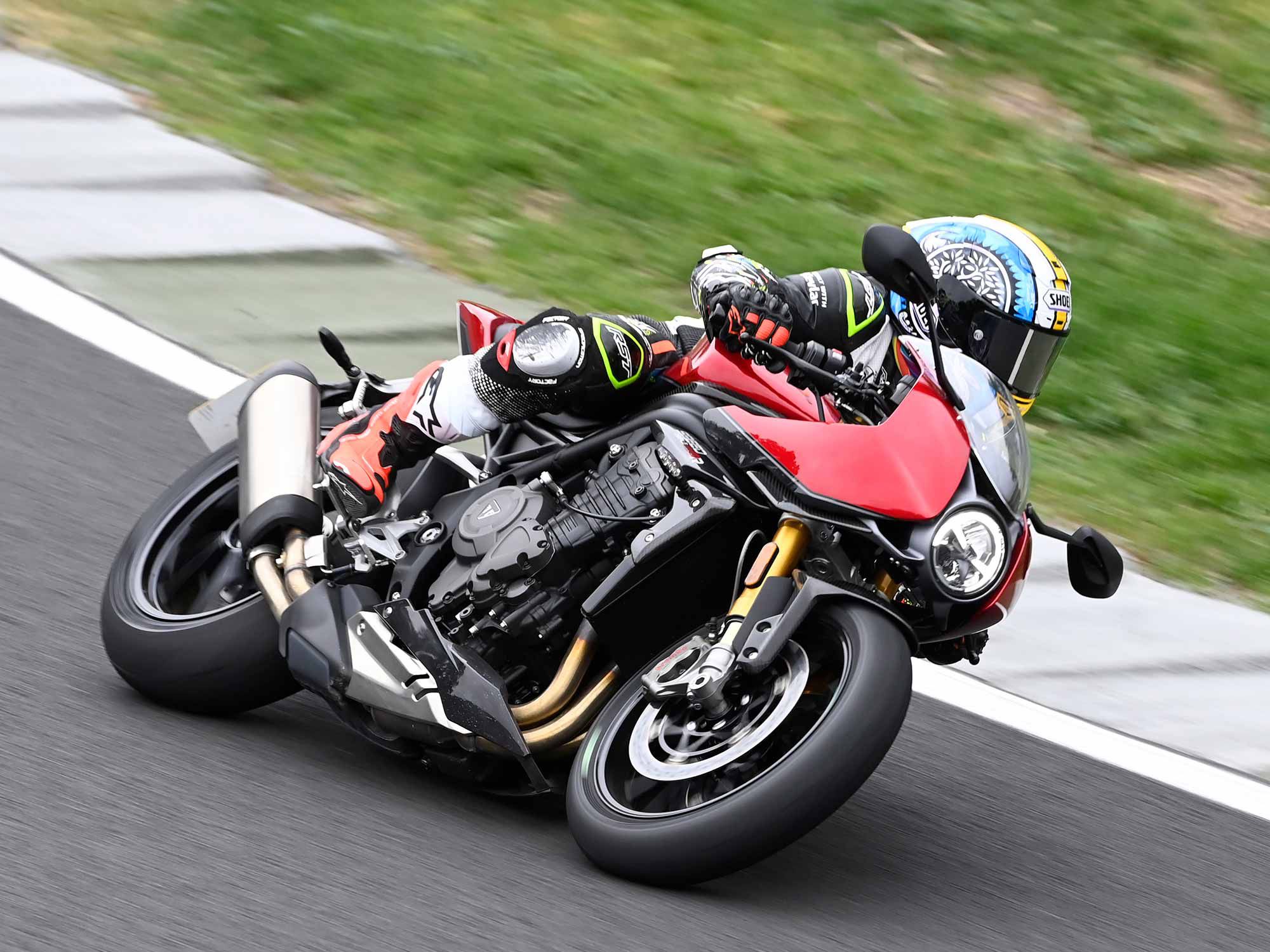
The new riding position feels more natural than the 1200 RS; you’re more over the fuel tank and set into the chassis. This encourages one to lean into corners—knee slider searching for Spanish tarmac.
Triumph has made an excellent roadbike. The chassis isn’t too radical, ergonomics is sporty but not extreme, and the handling is predictable and stable. And accompanying me on the ride is that stunning British triple, which so loves to bark.
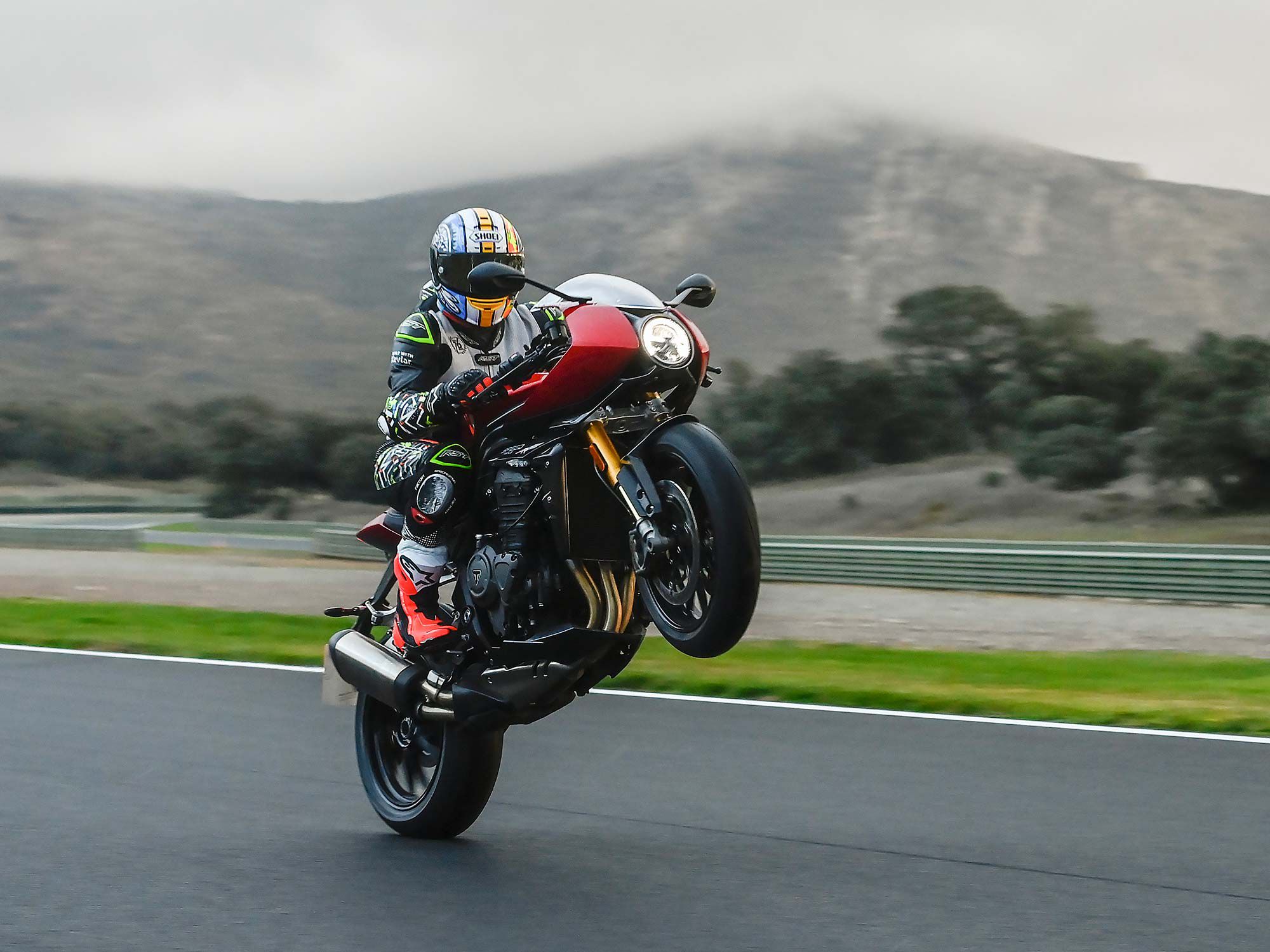
For the majority of the time, you can just play with fourth and fifth gears, you don’t need to dance up and down the standard Shift Assist quickshifter. OK, from time to time it’s rewarding to have a blast, without the clutch, kick back a few gears and get the wheelie control working overtime, but for the majority of the road ride it is all about the torque.
The fueling is a little sharp at slow speed in the Sport mode, but that can be rectified by flicking into Road or Rain mode. My sole complaint is that the lovely looking 5-inch full-color clocks—similar to the RS’, but now with the suspension settings displayed—are not initially intuitive and take a little getting used to. A couple of times I wanted to quickly flick between modes, an action that should only require me to take my eyes off the road for a second or so, but it always took me a few, repeated glances.
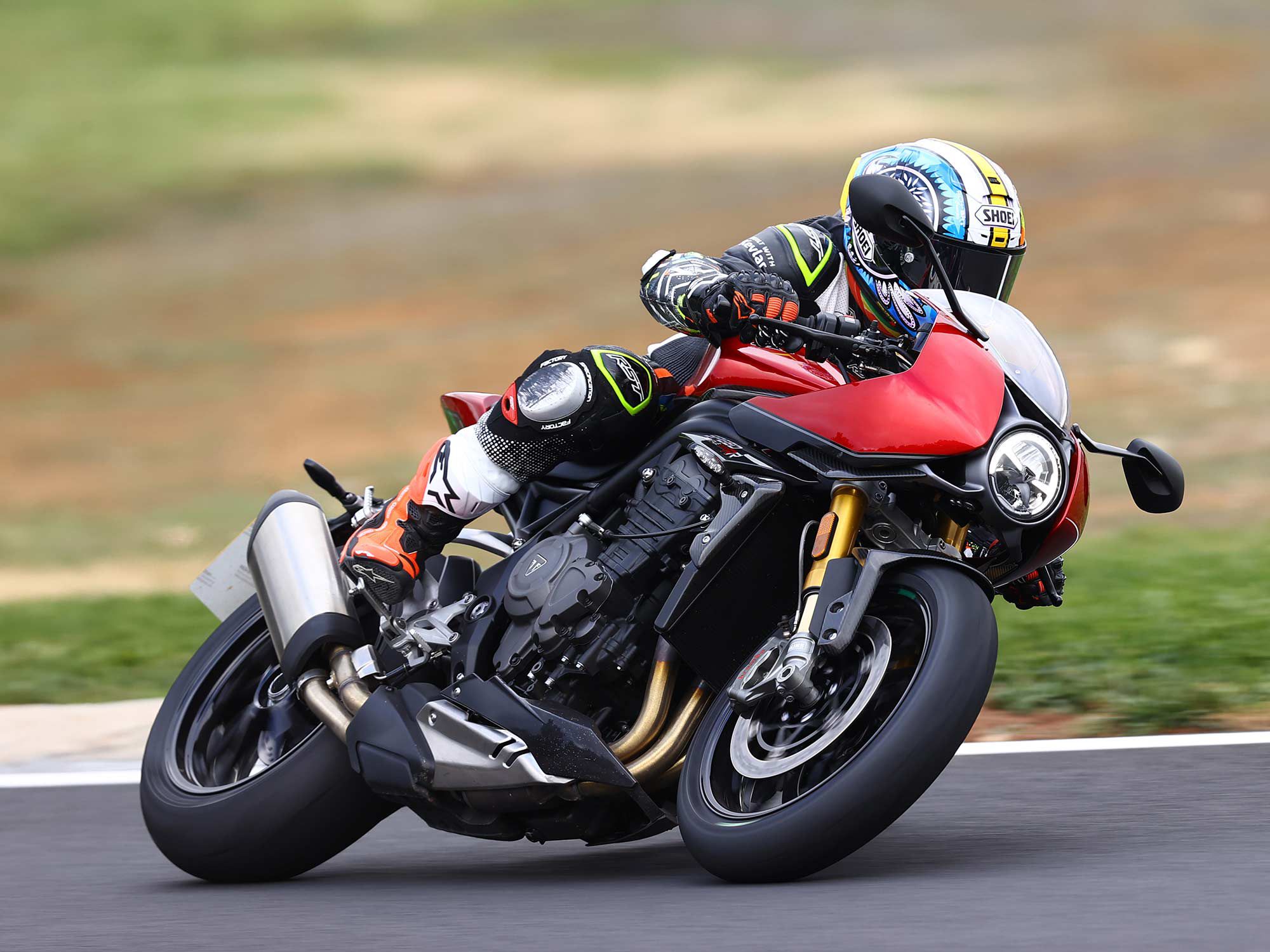
The lean-sensitive rider aids are there in the background, and will come in useful in slippery and wet conditions. But for 90 percent of the ride I completely forgot about the electronics altogether, and simply enjoyed a brisk and refreshing morning blast. The RR exerts no pressure on you to ride it like a TT racer.
On the final stretch of the road segment of the test, I relaxed completely as the RR piloted me back to the circuit on (standard) cruise control. As a roadbike I was struggling to find faults. Even after a few hours in the saddle I hadn’t a hint of the back, bum, and wrist ache some stretched-out cafes can inflict, Triumph’s own Thruxton and MV’s Superveloce included. I’d certainly take on some touring on the 1200 RR.
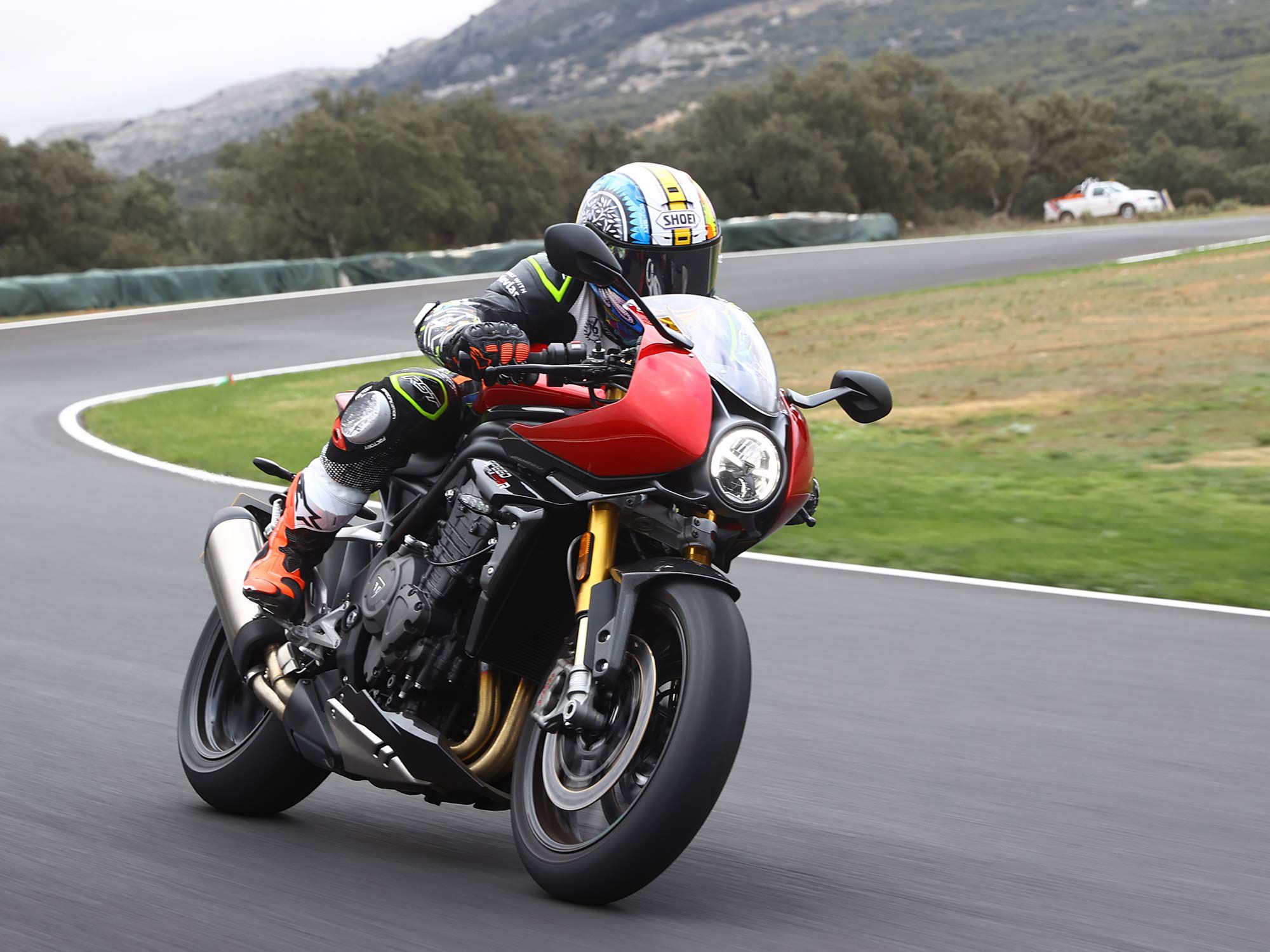
In Triumph’s defense, the new Speed Triple was not designed to be a pure track animal. Within a few laps I realized that the way to get the best out of the RR is to forget lap times and let it flow. That way you can’t help but enjoy the ride, which is arguably more satisfying than a full-on superbike as it’s so easy to pedal and more forgiving too.
You don’t have to be a former Superbike star to get a toe slider touching, while the rider aids haven’t been designed to dig out fast lap times. Instead, they are positioned in the background, working overtime to give you a sense of security. You can feel them intervening but are not intrusive—it’s a neat balance.
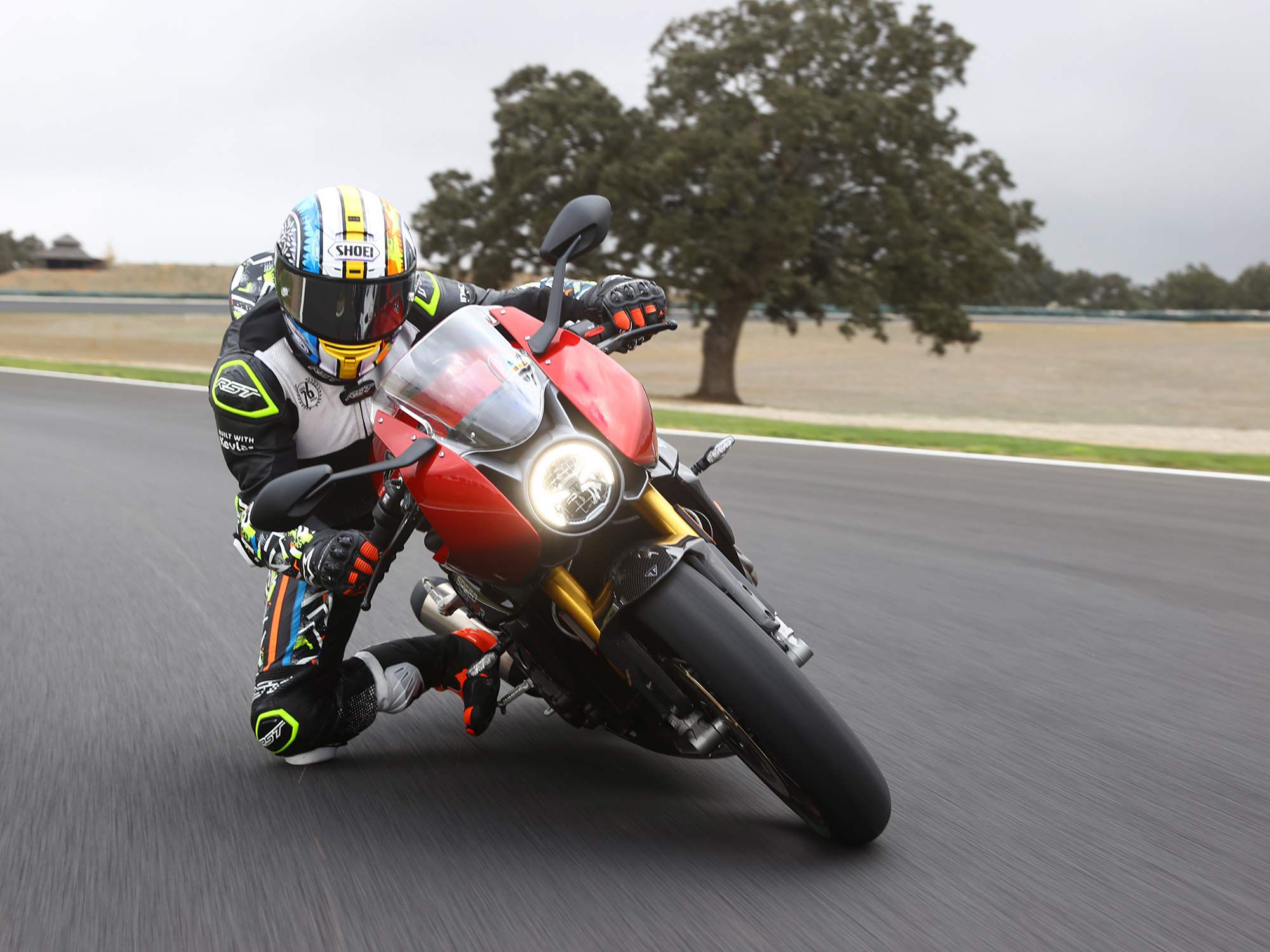
In session two, I opted to use a higher gear than normal, used all that wonderful torque and enjoyed its stable and predictable handling. It’s not a superbike designed to win races, but it can certainly still cut in on track. The only drawback was the Brembo Stylema stoppers, which are more than sufficient, but not a 10 out of 10 as the spec suggests.
Verdict
If you want a supersharp trackbike, then look somewhere else. The Triumph Speed Triple 1200 RR is an enormously competent sportbike that’s capable on track but confidently focused on the road. Make no mistake, with more torque than most road-legal superbikes and 178 hp, the RR shouldn’t be underestimated, but it’s not a racebike—thankfully it is more than that. It’s a lovely looking, desirable, charismatic motorcycle—a well-judged update on the cafe racer.
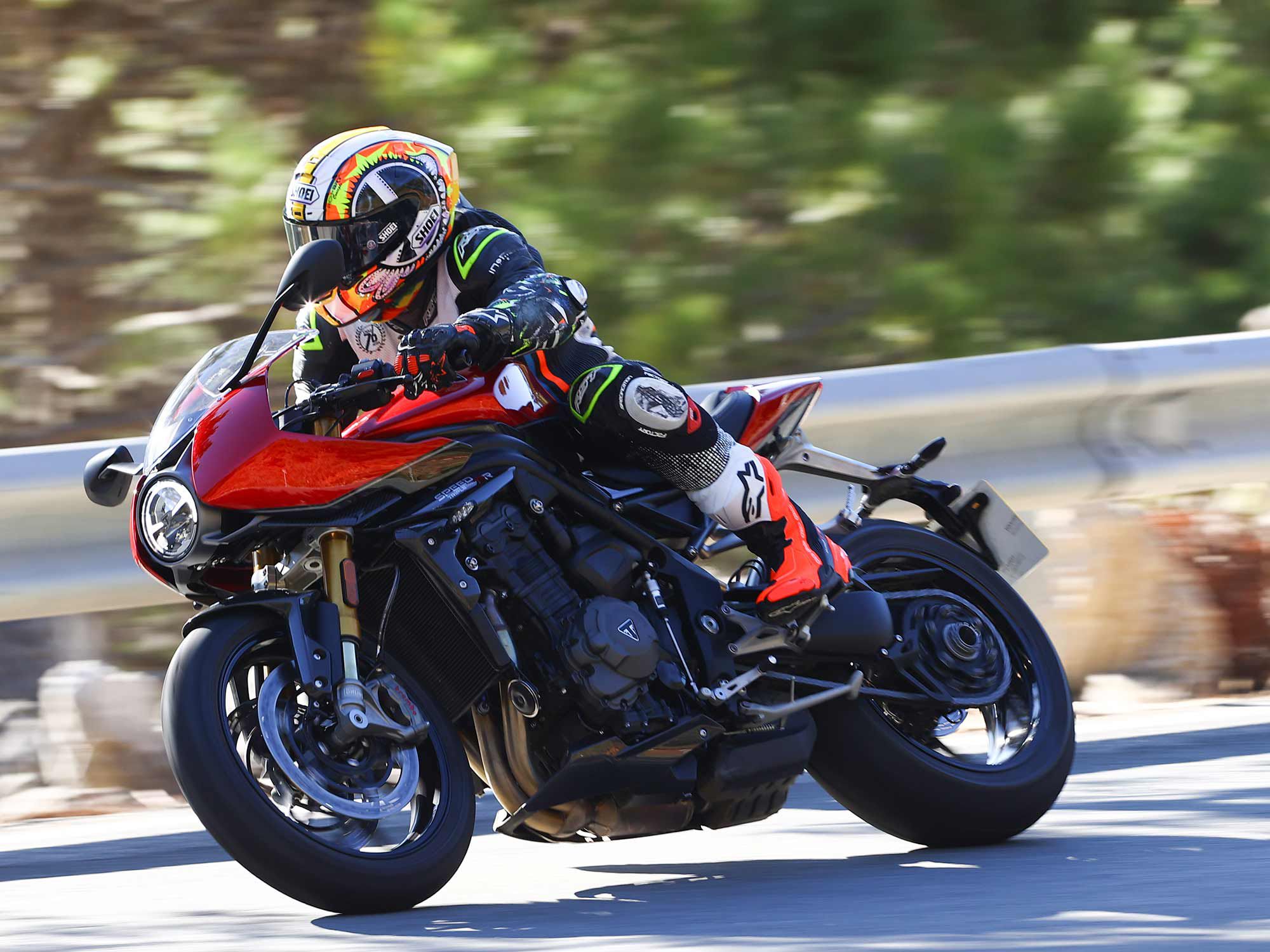
2022 Triumph Speed Triple 1200RR Specifications
| PRICE | $20,950 |
| ENGINE | 1,160cc, DOHC, liquid-cooled, inline three-cylinder; 4 valves/cyl. |
| BORE x STROKE | 90.0 x 60.8mm |
| COMPRESSION RATIO | 13.2:1 |
| FUEL DELIVERY | Fuel injection w/ 48mm throttle bodies, ride-by-wire |
| CLUTCH | Wet, multiplate, slip and assist |
| TRANSMISSION/FINAL DRIVE | 6-speed/chain |
| CLAIMED HORSEPOWER | 177.5 hp @ 10,750 rpm |
| CLAIMED TORQUE | 92.2 lb.-ft. @ 9,000 rpm |
| FRAME | Aluminum twin spar |
| FRONT SUSPENSION | Öhlins electronic fully adjustable 43mm fork; 4.7 in. travel |
| REAR SUSPENSION | Öhlins electronic shock, fully adjustable; 4.7 in. travel |
| FRONT BRAKE | Radial Brembo Stylema 4-piston caliper, dual 320mm floating discs w/ cornering ABS |
| REAR BRAKE | Brembo 2-piston caliper, 220mm disc w/ cornering ABS |
| WHEELS, FRONT/REAR | Cast aluminum; 17 x 3.5 in. / 17 x 6.0 in. |
| TIRES, FRONT/REAR | Pirelli Supercorsa SP V3; 120/70-17 / 190/55-17 |
| RAKE/TRAIL | 23.9°/4.1 in. |
| WHEELBASE | 56.7 in. |
| SEAT HEIGHT | 32.7 in. |
| FUEL CAPACITY | 4.1 gal. |
| CLAIMED CURB WEIGHT | 438 lb. |
| WARRANTY | 2 years, unlimited mileage |
| CONTACT | triumphmotorcycles.com |
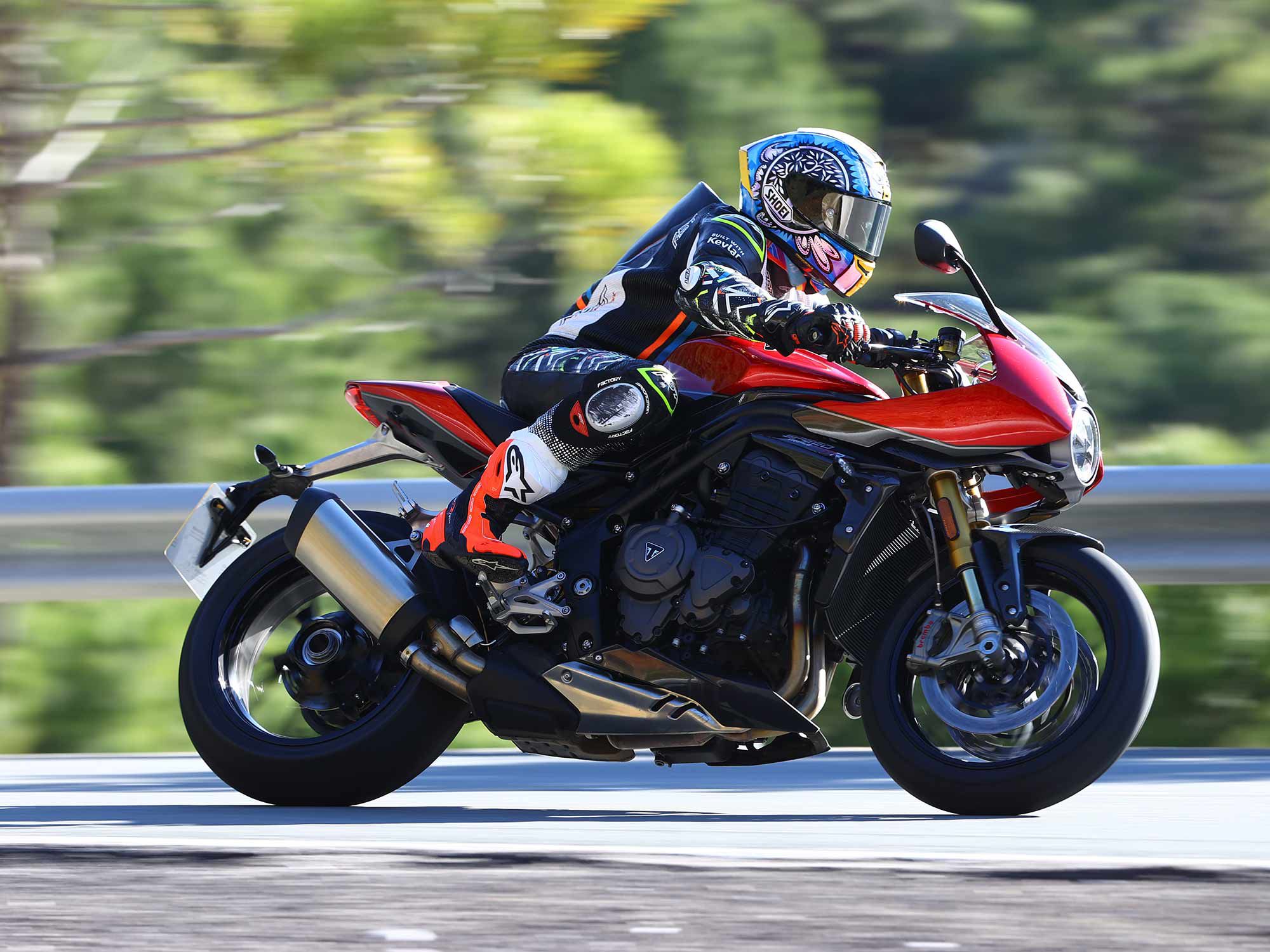
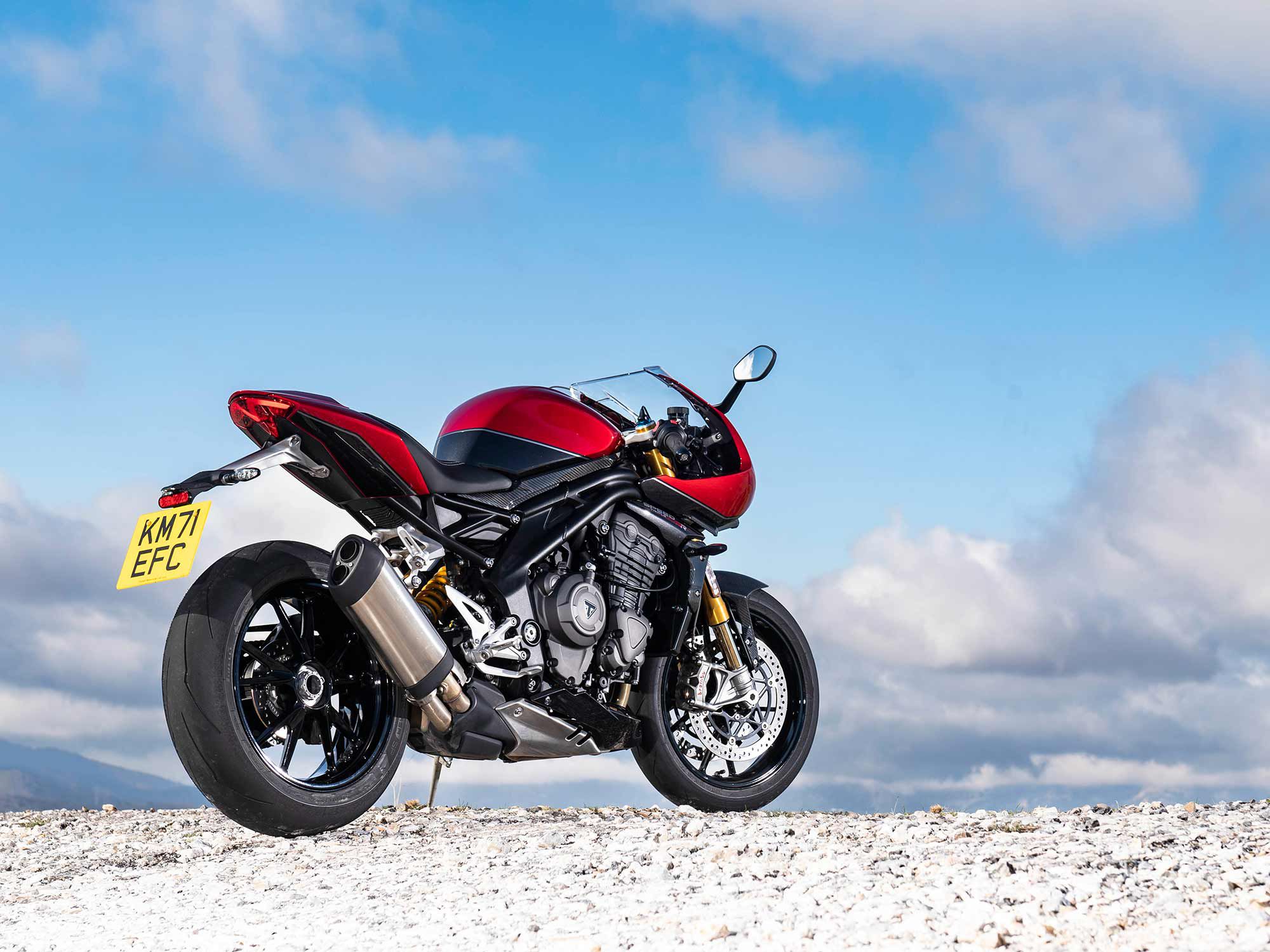
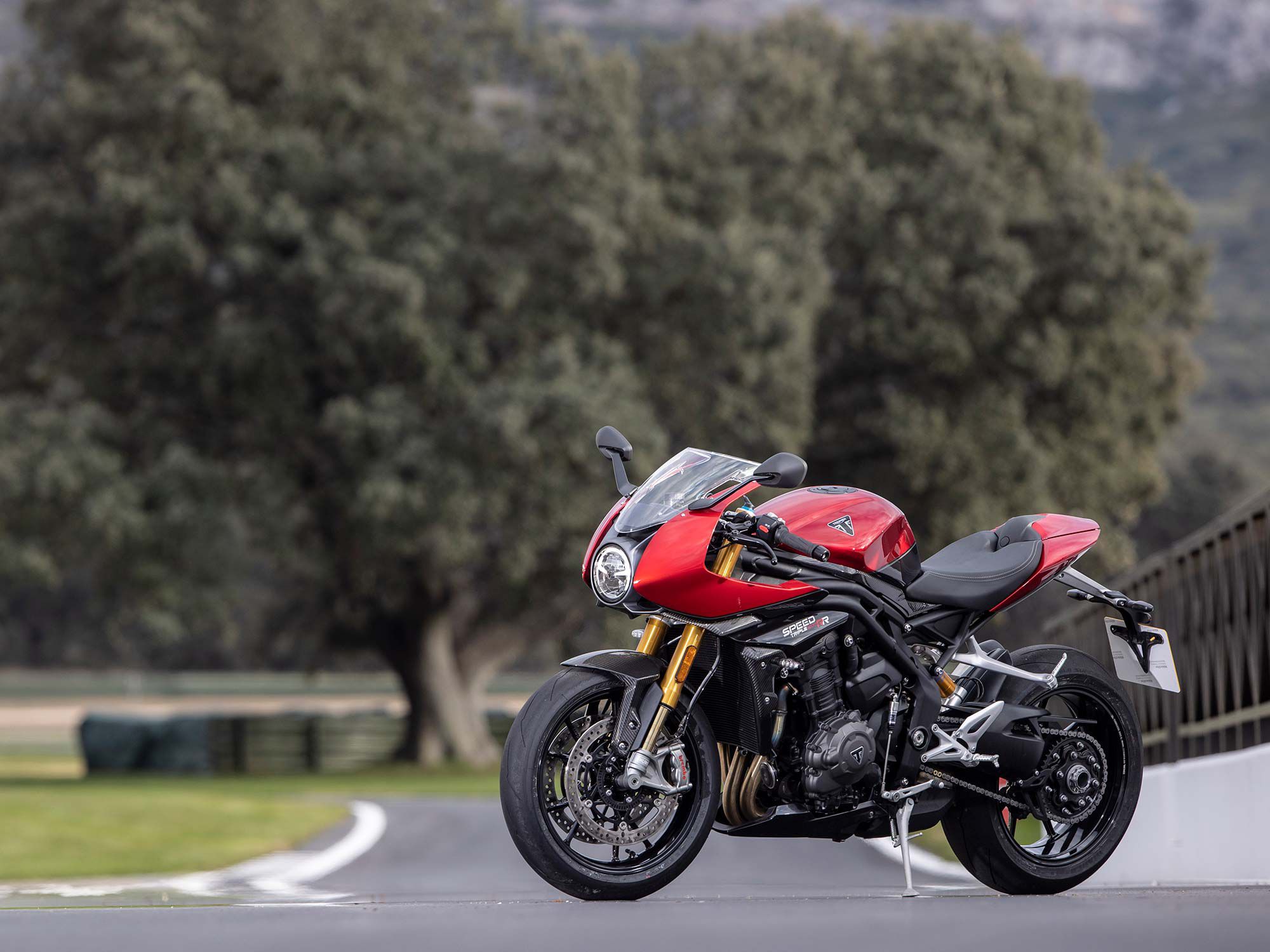
Source: MotorCyclistOnline.com
